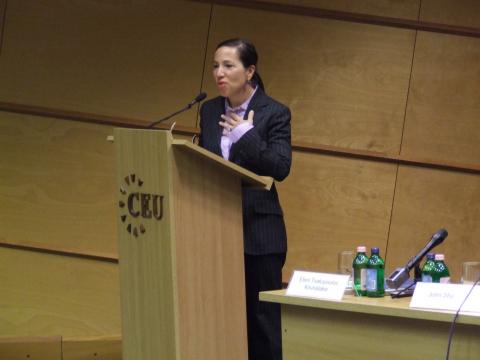CEU Welcomes US Ambassador to Hungary, Eleni Tsakopoulos Kounalakis

“The relations with Europe are critically important for the US. They are also the backbone and core of American relations with other parts of the world” said Eleni Tsakopoulos Kounalakis, US Ambassador to Hungary, in her lecture delivered on 11 March 2011 in the Auditorium of the university. The lecture, organized by the Embassy of the USA in Hungary, the Center for EU Enlargement Studies (CENS), CEU, the CEU Rector's Office and the Department of International Relations and European Studies (IRES), CEU was entitled “The Obama Administration's Foreign Policy at Mid-Term: The Transatlantic Challenge.” President and Rector John Shattuck gave welcoming remarks and also shared some of his own experiences as Assistant Secretary of State, later during the lecture.
Eleni Tsakopoulos Kounalakis started her speech by emphasizing how transatlantic relations had changed in the past twenty years. She stressed the US’s interest in a united, strong Europe that is capable of addressing pan-European challenges, and highlighted the importance of the Hungarian EU Presidency, especially in light of the fact that it set as priorities a number of US-supported initiatives- among others Croatia’s accession to the EU, the integration of the Roma population, and energy security. She praised Janos Martonyi, Hungarian Minister of Foreign Affairs and Csaba Hende, Hungarian Minister of Defense, with whom she visited the Hungarian contingent in Afghanistan. Ambassador Kounalakis recognized the Hungarian presence and the work of the 500-strong Hungarian army there. When discussing US foreign policy priorities in detail, she mentioned Afghanistan, and how responsibility for the future of the country must be shifted back to the people; and the Middle East, where she expressed the wish of the US government to see reforms across the region without violence. Concerning Libya, the Ambassador admitted that it was a challenge for both American and for European diplomacy, because “while the events in Egypt and Tunisia were colored with some violence, the full force of the military was not turned on the population, as is happening in Lybia.” Among other US foreign policy priorities she emphasized the complex relationship of the US with Europe and China, and the development of a common EU energy policy. Ambassador Kounalakis stated how the US government values the emphasis Hungary places on the EU’s Eastern Partnership Initiative. She concluded by saying that although the US government agenda is “wide and diverse, and while China and India may attract headlines, it is Europe that is standing by […] the side [of the US government] in every issue.”
The lecture was followed by a question and answer session moderated by President and Rector John Shattuck. Ambassador Kounalakis answered several questions coming from the floor, which consisted of members of the CEU community, representatives of the diplomatic core and the Hungarian media. The questions touched upon both US foreign affairs and internal Hungarian politics. Regarding how the US expects the Hungarian Presidency to handle the crisis in Lybia, the Ambassador mentioned how Eniko Gyori, Minister of State for EU Affairs in Hungary, plays an important coordinating role during the north-African crisis. In answer to the question about US-Russian relations the Ambassador stated that the most successful Obama initiatives had taken place exactly in this field. In terms of Hungarian internal politics, when asked about the planned new Hungarian constitution, Eleni Tsakopoulos Kounalakis did highlight that 170 new laws- among which some are controversial- had been passed by the new ruling party. However, she also noted that last year’s parliamentary elections in Hungary were free and democratic, and the current government won with an unprecedented majority that is unusual both in European and American terms. Concerning the new Hungarian constitution, she stressed that the US does not want to interfere with the internal politics of individual countries, and that the Hungarian experts will be able to prepare a solid constitution. The Ambassador warned though about not excluding anyone from formulating this important document. Other questions included: how the Ambassador’s work had changed since the WikiLeaks affair, what was discussed at the recent meeting of US Ambassadors with State Secretary Clinton, and what the US is trying to accomplish in Afghanistan.
The text of the public lecture delivered by Ambassador Kounalakis can be read on http://hungary.usembassy.gov/kounalakis_ceu2.html
To watch the video of the lecture and the following question and answer session, go to http://www.youtube.com/watch?v=cAIyeYMKpo0&feature=BF&list=SP35B562289309FCB5&index=35
